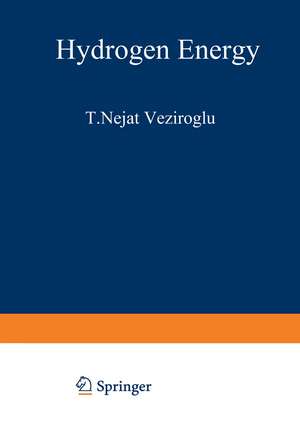Hydrogen Energy: Part A
Editat de T. Vezirogluen Limba Engleză Paperback – 25 feb 2012
Preț: 422.19 lei
Nou
Puncte Express: 633
Preț estimativ în valută:
80.79€ • 83.47$ • 67.21£
80.79€ • 83.47$ • 67.21£
Carte tipărită la comandă
Livrare economică 19 martie-02 aprilie
Preluare comenzi: 021 569.72.76
Specificații
ISBN-13: 9781468426090
ISBN-10: 1468426095
Pagini: 716
Ilustrații: XLI, 674 p.
Dimensiuni: 178 x 254 x 38 mm
Greutate: 1.22 kg
Ediția:Softcover reprint of the original 1st ed. 1975
Editura: Springer Us
Colecția Springer
Locul publicării:New York, NY, United States
ISBN-10: 1468426095
Pagini: 716
Ilustrații: XLI, 674 p.
Dimensiuni: 178 x 254 x 38 mm
Greutate: 1.22 kg
Ediția:Softcover reprint of the original 1st ed. 1975
Editura: Springer Us
Colecția Springer
Locul publicării:New York, NY, United States
Public țintă
ResearchCuprins
of Part A.- Banquet Address.- 1. Primary Energy Sources.- 1.1 Is Massive Solar Energy Conversion a Practical Prospect?.- 1.2 A Tower-Top Point Focus Solar Energy Collector.- 1.3 Reliability of Low Cost Cu2S/CdS Solar Cells for Large-Scale Conversion of Solar to Electrical Energy.- 1.4 Geothermal Energy as a Resource in a Hydrogen Energy Economy.- 1.5 The Effect of Atmospheric Turbulence on Windmill Performance.- 1.6 Hydrogen: The Ultimate Energy Source.- 2. Hydrogen Production.- 2.1 Nuclear Water-Splitting and High Temperature Reactors.- 2.2 High Temperature Nuclear Reactors as an Energy Source for Hydrogen Production.- 2.3 Hydrogen Production with a High Temperature Gas-Cooled Reactor (HTGR).- 2.4 Hydrogen Production from Decomposition of Water by Means of Nuclear Reactor Heat.- 2.5 Aqueous Homogeneous Reactor for Hydrogen Production.- 2.6 Wind Capture and Diversion Through Pneumatic Energy Recovery with Large Capacity Aerogenerators.- 2.7 Sea Thermal Power as a Hydrogen and Methanol Generator.- 2.8 Ocean Based Solar-To-Hydrogen Energy Conversion Macro System.- 2.9 Thermochemical Water Cracking Using Solar Heat.- 2.10 Photolysis of Water as a Solar Energy Conversion Process: An Assessment.- 2.11 The Technology and Economics of Hydrogen Production from Fusion Reactors.- 2.12 Economic Criteria of Selection for Closed Cycle Thermochemical Water-Splitting Processes.- 2.13 Comparative Study of Hybrid Energy Systems of Hydrogen and Electric Power.- 2.14 An Economic Perspective on Hydrogen Fuel.- 2.15 The Utilization of Solar Energy for Hydrogen Production by Cell Free System of Photosynthetic Organisms.- 2.16 An Analysis of Hydrogen Production Via Closed-Cycle Schemes.- 2.17 Hydrogen and Food Production from Nuclear Heat and Municipal Wastes.- 2.18 Hydrogen as Energy StorageElement.- 2.19 Hydrogen Opportunities in Saudi Arabia.- 2.20 On Methods for the Large-Scale Production of Hydrogen From Water.- 2.21 Electrolytic Hydrogen Generators.- 2.22 Electrolysis of Sea Water.- 2.23 Hydrogen Generation Through Static Feed Water Electrolysis.- 2.24 Hydrogen Generation by Solid Polymer Electrolyte Water Electrolysis.- 2.25 Evaluation of Multi-Step Thermo Chemical Processes for the Production of Hydrogen From Water.- 2.26 Considerations on Iron-Chlorine-Oxygen Reactions in Relation to Thermochemical Water-Splitting.- 2.27 Thermochemical Hydrogen Production Research at Lawrence Livermore Laboratory.- 2.28 Analysis of Thermo Chemical Water- Splitting Cycles.- 2.29 A Search for Thermochemical Water-Splitting Cycles.- 3. Hydrogen Storage and Transmissions.- 3.1 Pipeline Transportation of Hydrogen.- 3.2 Economics of Pipeline Transport for Hydrogen and Oxygen.- 3.3 Low Thermal Flux Glass-Fiber/Metal Vessels for LH2 Storage Systems.- 3.4 Electric Power and Fuel Transmission by Liquid Hydrogen Superconductive Pipeline.- 3.5 Optimal Location of Hydrogen Supply Centers to Minimize Distribution Costs.- 3.6 The Activation of a Lanthanum-Nickel-Five Hydrogen Absorbent.- 3.7 An Engineering-Scale Energy Storage Reservoir of Iron Titanium Hydride.- 3.8 Modeling Studies of Fixed-Bed Metal-Hydride Storage Systems.- 3.9 The Safety Characteristics of LaNi5 Hydrides.- 3.10 The Formation and Properties of Rare-Earth and Transition Metal Hydrides.






